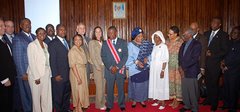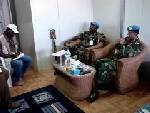
GUINEAN ARMY IN READINESS
BBCNEWS
Some question how long the army will back an unpopular presidentAt least seven people have been shot dead by the security forces in the West African state of Guinea during protests against the newly named prime minister.
Dozens more were seriously injured in the violence in the capital Conakry and several towns across the country.
President Lansana Conte named Eugene Camara as prime minister on Friday, meeting a deadline to avoid strikes.
However, the demonstrators say Mr Camara is too close to the president and are demanding a leadership change.
The violence erupted in the town of Kindia about 140km (87 miles) from the capital, Conakry. At least four of the deaths occurred there.
As well as the known seven civilian deaths, there are also unconfirmed reports that two soldiers were killed and their bodies burnt by protesters in the town of Kankan.
The BBC's Will Ross in Conakry says the capital is in chaos after protesters went on the rampage, ransacking government offices and the homes of government ministers.
Gunfire can be heard in several areas of the city, our correspondent says, and young demonstrators have blocked roads with rocks and burning tyres.
Mr Conte had agreed to hand over the running of the government by Sunday in order to avoid the resumption of an 18-day strike which unions ended last month.
But people are angry that Mr Conte has chosen a close ally for the post of prime minister.
Mr Camara has been in government for several years and worked as the minister for presidential affairs.
Our correspondent says unions fear Mr Camara will simply be the president's puppet, and are demanding a complete change of leadership instead.
President Conte has won three elections since seizing powerSome 60 people died during the recent strikes, called over falling living standards and alleged mismanagement.
Guinea is mineral rich but has also been described as the most corrupt country in the world, and most people live in abject poverty.
The president seized power in a 1984 coup but has since won three elections. Now in his seventies and suffering ill-health, there is an overwhelming desire for him to step down.
Our reporter says there is a fear that Mr Conte's reluctance to relinquish power could have dire consequences for Guinea's neighbours - Liberia, Sierra Leone and Ivory Coast - which have all been plagued by conflict.



No comments:
Post a Comment